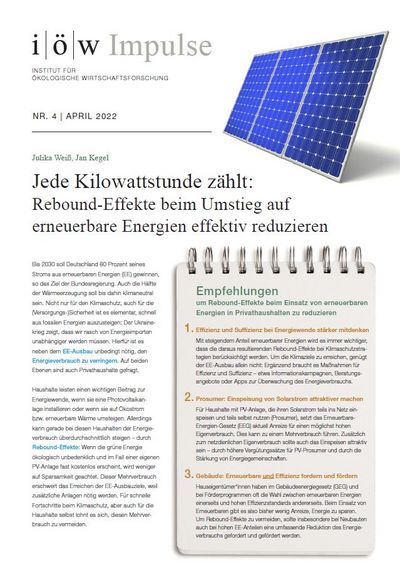Each kilowatt-hour matters: Effectively reducing rebound effects when switching to renewable energies
The German government's climate protection goals for electricity and heat can only be achieved if private households increasingly switch to green electricity and renewable heat and if more and more homes install photovoltaic systems. However, such a switch to renewable energies (RE) can lead to an increase in household energy consumption, as studies by the RE Rebound project show: Households pay less attention to frugal energy consumption behaviour, for example due to the low running costs of their own photovoltaic system.
In addition to the expansion of RE, efficient as well as sufficiency-oriented energy consumption must therefore urgently be strengthened. To this end, this policy paper identifies levers that can reduce rebound effects when switching to renewable energies: both misguided incentives that need to be corrected and strategies for a greater consideration of efficiency and sufficiency in the energy transition. In addition to the legislator, consumer centres, climate protection agencies and energy providers are therefore also in demand: at the interface with households, advisors and installers, they can raise awareness for moderate consumption.
Recommendations to reduce rebound effects of private households when using renewable energies
1. Greater consideration to efficiency and sufficiency in the energy transition
With the increasing share of renewable energies, it is becoming more and more important that the resulting rebound effects are taken into account in climate protection strategies. In order to achieve the climate targets, the expansion of renewable energies alone is not enough: efficiency and sufficiency measures are also needed - such as information campaigns, advisory services or apps for monitoring energy consumption.
2 Prosumers: Making the feed-in of solar power more attractive
For households with PV systems that partly feed their solar electricity into the grid and partly use it themselves (prosumers), the Renewable Energy Sources Act (EEG) currently provides incentives for the highest possible self-consumption. This can lead to increased consumption. In addition to grid-serving self-consumption, feed-in should also be attractive - through higher remuneration rates for PV prosumers and by strengthening energy communities.
3 Buildings: Demanding and promoting renewables and efficiency
The Building Energy Act (GEG) and subsidy programmes often demands houseowners to choose between renewable energies on the one hand and high efficiency standards on the other hand. So far, there are little incentives to save energy when using renewables. In order to avoid rebound effects, a comprehensive reduction of energy consumption should be demanded and promoted, especially in new buildings, even with high RE shares.



